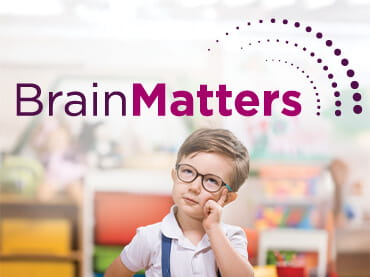- Find a Provider
- Locations
-
Services
- Specialties and Services
- See All Services
Specialties and ServicesBehavioral Health Care Coordination Check In Faster COVID-19 Vaccine Dermatology Driver’s Physical Express Care Flu Vaccine Services Fluoride VarnishLactation Consulting Newborn Care Nutrition Services Online Scheduling Patient Portals Primary Care Medical Home ImPACT® Testing ResearchSame-day Sick Appointments Sports Physicals Substance Use Education Teen Resources Transition to Adulthood Video Visits Walk-in Services Weight Management - Health Resources
-
About Us
- About UPMC CCP
- Patient Resources
About UPMC Children's Community Pediatrics
What’s Going on in Their Brain? A Parent’s Guide to Behavior and Brain Development
One minute they’re sweet and cooperative, the next they’re acting out or overwhelmed and you have no idea why. Whether you're parenting a toddler or a teen, one thing’s for sure: Behavior can feel like a mystery, but not one you need to solve alone.
Behavior Is Just the Tip of the Iceberg
- That toddler tantrum while shopping? It’s not just a phase.
- That 13-year-old giving you the silent treatment? It’s not just hormones.
- That explosion over a text message at midnight? It’s not just attitude.
Their brains are still under construction and because of that, sometimes they “just can’t.”
What’s Really Going on Up There?
For little kids, their prefrontal cortex (the part responsible for impulse control, decision-making, and emotional regulation) is just developing. They're not necessarily being naughty. Their brains and skills are growing rapidly but they are not yet able to recognize the limits.
For teenagers, their brains are remodeling fast and furiously. The emotional centers (like the amygdala) are highly reactive, with logic and risk assessment struggling to catch up. Their brains are wired to feel first, think later.
What This Means for Parents
When your kid flips out, zones out, or pushes back, it’s not about being bad or lazy. It’s often their brain saying, “I’m overwhelmed. I don’t know how to handle this. I need guidance, not punishment.”
Kids must learn how to express themselves and self-regulate. These are skills we are not born with but strategies that are learned over time—when and how depends on your child’s developmental stage. Setting appropriate expectations, you and your child can better work together as a team to navigate big reactions while promoting long-term brain development.
So, What Can You Do?
- Regulate yourself first – Their nervous system mirrors yours. Calm is contagious.
- Name the emotion – For both little ones and teens, describing the emotion, such as “You’re really frustrated right now” or “You’re really angry,” helps them process feelings.
- Connect before you correct – Prioritize connection for better listening. They’re more likely to listen after they feel seen and safe.
- Pause before fixing – Ask what support they need before offering solutions.
- Be clear and consistent – Collaborate on strategies for expressing feelings.
It’s Not About Obedience. It’s About Skill-Building.
Your job isn’t to control your child’s behavior—it’s to coach their brain. The goal is to help them build lifelong tools for managing stress, emotions, relationships, and good decision-making.
If your child’s behavior has you feeling frustrated, defeated, or confused—you’re not alone.
But when you shift from “What’s wrong with them?” to “What’s going on in their brain?”— everything changes. You stop reacting and start understanding. And that’s where real connection (and better behavior) begins.
Guidance for Growing Minds
At UPMC Children’s Community Pediatrics, we’re passionate about helping families understand the incredible journey of brain development. That’s why we created Brain Matters—a program offering expert guidance, parenting resources, and tools to support your child’s brain health from infancy through the teen years.
Explore Brain Matters today.





